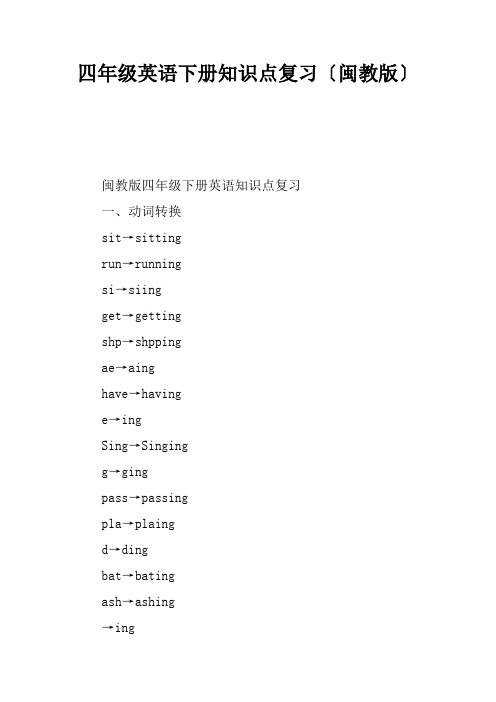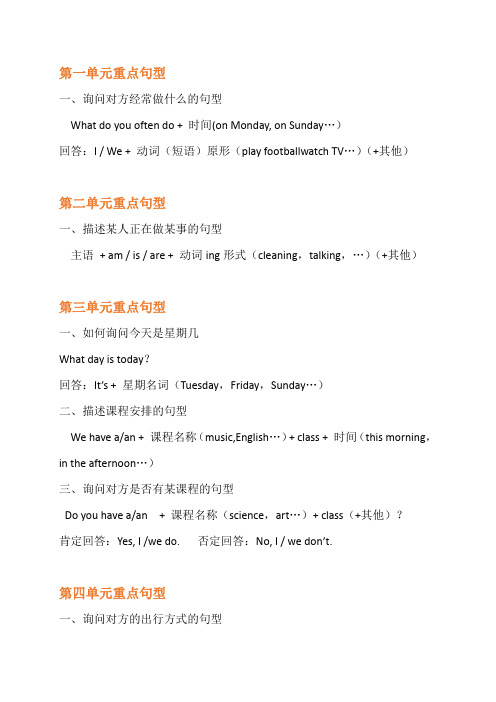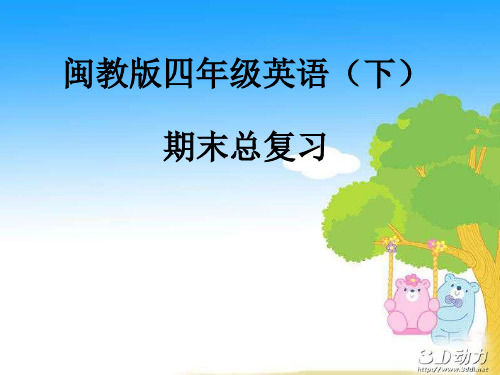闽教版小学英语四年级下重点句子
- 格式:docx
- 大小:10.52 KB
- 文档页数:2

四年级英语下册知识点复习〔闽教版〕闽教版四年级下册英语知识点复习一、动词转换sit→sittingrun→runningsi→siingget→gettingshp→shppingae→ainghave→havinge→ingSing→Singingg→gingpass→passingpla→plaingd→dingbat→batingash→ashing→ingdra→draingread→readingeat→eatingear→earing二、交通工具、bbus2、bbie3、btrle4、bar、nft6、btrain7、bplane询问做什么交通工具句式为:Hdugtshl?或者Hdeshegtshl?三、食物吃东西用的动词为第一、二人称〔如你、我、我们、他们〕时用“have〞第三人称〔如他、她、它〕用“has〞:、ehavehtdgs2、ehavendls3、ehaverieandfish4、ehaveierea、ehavehaburgers6、ehaveduplings四、单复数、dupling→duplings2、vegetable→vegetables3、haburger→haburgers4、egg→eggs、peah→peahes6、grape→grapes7、ae→aes8、apple→apples9、arrt→arrts0、htdg→htdgs只能是单数表示的东西:、ierea2、fish3、eln4、rie、tea6、fruit7、sap8五、房子构造〔要注意搞清楚哪些东西是在哪个房间的〕、asittingr2、abedr3、adiningr4、aithen、astud6、abathr六、方位词〔n、in或near〕、一般在某个物体里面的用“in〞如:①、Blabardinlassr②、indsinlassr③、pianintheusir④、penilsinpenil-ase⑤、iereainthefridge2、假如是在某个物体上面,不被包住的用“n〞如:①、lntheall②、pituresntheall③、bnthetable3、在某个物体的边上就用“near〞七、目、English2、hinese3、ath4、puter、usi6、art7、PE8、siene八、句式、做什么交通工具?Hdugtshl?或者Hdeshegtshl?答复:Igtshlbbus。

第一单元重点句型一、询问对方经常做什么的句型What do you often do + 时间(on Monday, on Sunday…)回答:I / We + 动词(短语)原形(play footballwatch TV…)(+其他)第二单元重点句型一、描述某人正在做某事的句型主语+ am / is / are + 动词ing形式(cleaning,talking,…)(+其他)第三单元重点句型一、如何询问今天是星期几What day is today?回答:It’s + 星期名词(Tuesday,Friday,Sunday…)二、描述课程安排的句型We have a/an + 课程名称(music,English…)+ class + 时间(this morning,in the afternoon…)三、询问对方是否有某课程的句型Do you have a/an + 课程名称(science,art…)+ class(+其他)?肯定回答:Yes, I /we do. 否定回答:No, I / we don’t.第四单元重点句型一、询问对方的出行方式的句型How do you go (to) + 地点(the park,school,home…)?回答:I / We go (to)+ 地点+ 出行方式(by bus, on foot, by train…)拓展:如何询问他人的出行方式How does + 主语(第三人称单数)+ go(to)+ 地点?二、确认他人的出行方式的句型Does + 主语(第三人称单数)+ go(to)+ 地点(school, Beijing, there…)+ 出行方式(by bus, on foot, by train…)?肯定回答:Yes,he/she does. 否定回答:No, he/she doesn’t.三、如何描述某人乘坐某种交通工具主语+ go/goes + 出行方式.四、介绍某地是一个美丽的地方的句型某地+ is a beautiful place.第五单元重点句型一、询问物品价格的句型How much is / are + 主语(it,they)?回答:It’s / They are + 基数词(sixty twenty…)+ 货币单位二、表达需要什么东西的句型主语+ need + 需要的东西(flowers,money…)表达自己需要做某事的句型I need + to do sth.表达他人需要做某事的句型第三人称单数+ needs + to do sth.第六单元重点句型一、询问某地天气情况的句型How is the weather in + 地点名称(Beijing Shanghai Harbin …)?回答:It’s + 天气情况(raining warm windy…).二、如何询问对方的穿着What do you wear?回答:I/ We wear + 衣物(a shirt,a skirt,a hat ,dresses…).拓展:询问他人穿着的句型What does + 主语(第三人称单数)+ wear?回答:He / She wears + 衣物.What do + 主语(第三人称复数)+ wear?回答:They wear + 衣物.第七单元重点句型一、如何询问对方最喜欢什么季节What’s your favorite season?回答:季节名称(spring summer autumn winter)拓展:询问他人最喜欢什么季节的句型What’s + his/her/名词所有格+ favorite season?二、询问对方是否喜欢某季节的句型Do you like +季节(spring summer autumn winter)?肯定回答:Yes,I /we do. 否定回答:No,I/we don’t.第八单元重点句型一、询问对方计划的句型What will you do …?回答:I/We will + 动词原形(+其他)二、询问对方是否将要做某事的句型Will you +动词原形(+其他)?肯定回答:Yes,I /we will. 否定回答:No,I/we won’t.。

Unit 1 Winter Vacation短语:the Great Wall 长城watch TV 看电视take a boat tour 划船旅行Sun Moon Lake 日月潭play chess with 与……下棋do my homework 做我的家庭作业swim in the sea 在海里游泳句型:How was your winter vacation? It was wonderful.How about you?Were you in China? No, I wasn’t.How was the weather there? It was hot!动词过去式:is/am —was are —wereeat —ate go —wentsee —saw visit —visitedwatch —watched play —playeddo —did take —tookrun —ran come —cameget —got want —wantedswim —swam give —game语法(一般过去时):(1)规则动词过去式的构成有四条规则:①一般在动词原形末尾直接加上-ed。
如:look—looked,visit—visited,watch—watched。
②以不发音的字母e结尾的动词,只需加-d。
如:live—lived。
③末尾只有一个辅音字母的重读闭音节,先双写这个辅音字母,再加-ed。
如:stop—stopped。
④末尾是“辅音字母+y”结尾的动词,先改y为i,然后再加-ed。
如:study—studied。
(2)不规则动词的过去式需要记忆。
如:am/is—was,are—were,go—went,swim—swam,do/does—did, come—came,take—took,have/has—had等。
学习be动词在一般过去时中的回答:如:①Were they in the supermarket? Yes,they were./ No,they weren’t.② Was he in Beijing? Yes, he was./ No, he wasn’t.Unit 2 A Visit to the Zoo短语:over there 那儿go straight 直走have a look 看一下turn left/right 向左/右转behind the hill 在山后take a photo of 给……照相give food to the monkeys 给猴子喂食under the tree 在树下句型:Where are they?There are some elephants behind the hill.What animals did you see, children?Did you give bananas to the monkeys?Did you take any photos?语法:学习过去时did作为疑问句开头的回答:如:①Did you take any photos? Yes, I did. / Yes, I took some photos.②Did you give food to the monkeys? No, we didn’t.③What animals did you see?We saw tigers, bears and elephants.④—Did you have a good time?(你们玩得快乐吗?)—Yes,we did./ Yes,we had a good time.(是的,我们玩得很快乐。



闽教版四年级下册英语知识点复习一、动词转换sit→sitting run→running swim→swimming get→getting shop→shoppingmake→making have→having come→comingSing→Singing go→goingpass→passingplay→playing do→doing boat→boatingwash→washing cook→cookingdraw→drawing read→reading eat→eating wear→wearing二、交通工具1、bybus2、bybike3、bymotorcycle4、bycar5、onfoot6、bytrain7、byplane询问做什么交通工具句式为:Howdoyou(they)gotoschool?或者Howdoeshe(she)gotoschool?三、食物吃东西用的动词为第一、二人称(如你、我、我们、他们)时用“have”第三人称(如他、她、它)用“has”:1、wehavehotdogs2、wehavenoodls3、wehavericeandfish4、wehaveicecream5、wehavehamburgers6、wehavedumpling四、单复数1、dumpling→dumplings2、vegetable→vegetable3、hamburger→hamburgers4、egg→egg5、peach→peaches6、grape→grape7、cake→cakes8、apple→apple9、carrot→carrots10、hotdog→hotdog只能是单数表示的东西:1、icecream2、fish3、melon4、rice5、tea6、fruit7、soap8五、房子结构(要注意搞清楚哪些东西是在哪个房间的)1、asittingroom2、abedroom3、adiningroom4、akitchen5、astudy6、abathroom六、方位词(on、in或near)1、一般在某个物体里面的用“in”如:①、Blackboardinmyclassroom②、windowsinmyclassroom③、pianointhemusicroom④、pencilsinmypencil-case⑤、icecreaminthefridge2、如果是在某个物体上面,不被包住的用“on”如:①、clockonthewall②、picturesonthewall③、bookonthetable3、在某个物体的边上就用“near”七、课目(注意有些课目第一个字母要大写,有些整个词都得大写)1、English2、Chinese3、math4、computer5、music6、art7、PE8、science八、句式1、做什么交通工具?Howdoyou(they)gotoschool?或者Howdoeshe(she)gotoschool?回答:I(they)gotoschoolbybus。
乐加·小学同步英语新版四年级下册句型&词组1.What do you often do every week / on Monday 你们每星期/做什么星期一升国旗。
on Monday星期一升国旗。
do you often do on Saturday and Sunday 你星期六和星期日经常做什么I play the violin on Saturday.我星期六拉小提琴。
I play football on Sunday. 我星期日踢足球。
3.It is Friday.星期五了。
Let’s clean our classroom.我们一起把我们的教室弄干净吧。
4.Lily is cleaning the desks. 李莉正在把桌子弄干净。
5.Please turn off the lights and fans.请关掉灯和风扇。
6.Please close the windows / door .请关窗户 / 门。
day is today 今天星期几It’s Wednesday.星期三。
We have a math class this morning.我们早上有一节数学课。
you have a science class on Monday 星期一你有科学课吗Yes, I do.是的,我有。
you have a Chinese class 你有语文课吗No, I don’t.不,我没有。
do you go to school 你是怎么去上学的 By school bus. 乘坐校车。
凯特是怎么去上学的She goes to school on foot.她步行/走路去上学。
He goes to work by car.他坐小轿车去上班。
Yes, she does.是的,她是。
No, she doesn’t .不是,她不是。
every week每星期raise national flag升国旗class meeting班会 in the playground在操场play the violin拉小提琴play football踢足球 clean the blackboard擦黑板/把黑板弄干净well done做的很好 turn off 关掉(电灯等)close the door关门English class英语课by school bus乘坐校车go to work去上班by bike骑自行车 on foot步行,走路by ship乘坐轮船 by train乘坐火车 by plane乘坐飞机 go home回家go to school去上学’s mother is in the kitchen.莎莉的妈妈在厨房。
闽教版小学英语四年级重点词组闽教版小学英语四年级重点词组四年级上词组We're in Grade Four now.我们现在四年级了。
Class One,Grade Four.四年一班。
look at the blackboard看着黑板read after me跟我读Who's that girl?那个女孩是谁?XXX…她来自……Which class are you in?你在哪班?This is our…这是我们的……so many这么多How much is XXX? 17加3等于多少?XXX九点三十分了。
have a sleep睡一觉get into进入get up起床have XXX吃早饭go to school去上学go home回家go to bed去睡觉XXX?午饭吃什么?I want…我想要……Do you like…?Yes, I do.你喜欢……吗?是的,我喜欢。
have some…XXX.请吃一些……I'm full.我饱了。
What presents do you want?你们想要甚么礼品?Merry Christmas!圣诞节康乐!How do you spend it?你们怎样渡过它?Spring Festival Party春节联欢晚会make rice cakes做米糕make dumplings包饺子on TV在电视上New Year's money压岁钱go to the fair去庙会after dinner晚餐后四年级下词组every week每周raise our national flag升国旗have a class XXX在操场have sports做运动clean our classroom打扫我们的教室play the XXX拉小提琴play football踢足球XXX站在椅子上well done做得好clean and bright干净又明亮close the windows关窗户turn off关掉have a math class有一节数学课be not good at不善于Don't worry别担心May I use…?我可以使用……吗?Here you are.给你。
闽教版四年级下册英语知识点复习一、动词转换sit→sit ting run→run ning swim→swim mingget→get ting shop→shop ping wwW .x kB 1.c Ommake→mak ing have→hav ing come→com ingSing→Sing ing go→go ing pass→pass ingplay→play ing do→do ing boat→boat ingwash→wash ing cook→cook ing draw→draw ingread→read ing eat→eat ing wear→wear ing二、交通工具1、by bus2、by bike3、bymotorcycle4、by car5、on foot6、by train7、by plane询问做什么交通工具句式为:How do you(they) go to school?或者How does he(she) go to school?三、食物吃东西用的动词为第一、二人称(如你、我、我们、他们)时用“have”第三人称(如他、她、它)用“has”:1、we have hot dogs2、we have noodls3、we have rice and fish4、we have ice cream5、we have hamburgers6、we have dumplings四、单复数1、dumpling→dumpling s2、vegetable→vegetable s3、hamburger→hamburger s4、egg→egg s5、peach→peach es6、grape→grape s7、cake→cake s 8、apple→apple s9、carrot→carrot s 10、hot dog→hot dog s只能是单数表示的东西:1、ice cream2、fish3、melon4、rice5、tea6、fruit7、soap 8五、房子结构(要注意搞清楚哪些东西是在哪个房间的)1、a sitting room2、a bedroom3、a dining room4、a kitchen5、a study6、a bathroom六、方位词(on、in或near)1、一般在某个物体里面的用“in”如:①、Blackboard in my classroom ②、windows in my classroom ③、piano in the music room ④、pencils in my pencil-case⑤、ice cream in the fridge x k b 1 .c o m2、如果是在某个物体上面,不被包住的用“on”如:①、clock on the wall ②、pictures on the wall③、book on the table3、在某个物体的边上就用“near ”七、课目(注意有些课目第一个字母要大写,有些整个词都得大写)1、English2、Chinese3、math4、computer5、music6、art7、PE8、science八、句式1、做什么交通工具?How do you(they) go to school?或者How does he(she) go to school? 回答:I(they) go to school by bus。
闽教版小学英语四年级下册总复习
1、What do you often do every week?(你们每星期经常做什么?)
()
2、On Monday we raise our national flag.(在星期一,我们升国旗。
)
()
3、We have a class meeting on Tuesday.(我们星期二开班会。
)
()
4、We have sports in the playground.(我们在操场上进行体育锻炼。
)
()
5、We clean our classroom on Friday.(星期五我们打扫教室。
)
()
6、I play the violin on Saturday.(星期六我拉小提琴。
)
()
7、I play football on Sunday.(星期天我踢足球。
) ()
8、We dance in the playground on Wednesday. (我们星期三在操场上跳舞。
)
()
9、Yang Ming is standing on a chair.(杨明站在椅子上。
) ()
10、He is cleaning the blackboard.(他正在擦黑板。
) ()
11、Lily is cleaning the desks.(李丽正在擦桌子。
) ()
12、Julia is cleaning the chairs.(朱莉娅正在擦椅子。
) ()
13、Please close the windows.(请关上窗户。
)
()
14、Please turn off the lights and fans.(请关上电灯和电风扇。
)
()
15、What day is today?(今天星期几?)It’s Wednesday.(星期三。
) ()
16、We have a math class this morning.(我们今天上午有一节数学课。
)
()
17、We have an English class,too.(我们上午也有一节英语课。
)
()
18、Do you like English?(你喜欢英语吗?)
()
19、He is good at math,but I’m not good at it.(他数学学得很好,但我学得不好。
)
()
20、I can help you.(我能帮助你。
) It’s very nice of you.(你真好。
)
()
21、Do you have a science class this morning?(你今天上午有科学课吗?)
()
22、Yes,I do.(是的有)No,I don’t.(没有。
)
()
23、And our teacher is very interesting,too.(教我们科学课的林老师也很有趣。
)
()
24、How do you go to school,Sally?(萨莉,你怎样上学?) By car.(乘坐小轿车
上学。
)()
25、How does Kate go to school?(凯特怎样上学?)She goes to school on foot.(她
步行上学。
)()
26、Does she go to Taiwan by plane?(她乘飞机去台湾吗?) ()
27、No,she doesn’goes by ship.(不,她乘轮船去。
) ()
28、I need some chicken,some fruits,tea and orange juice.(我需要买一些鸡肉、
水果、茶叶和橙汁。
)
29、How much is it?(多少钱?)It’s two hundred yuan.(两百元。
)
()
30、How is the weather in Beijing?(北京的天气怎样?)It’s ’s very
cold.(在下雪,很冷。
)()
31、What do you wear?(你穿什么衣服?)I wear a sweater.(我穿毛衣。
)
()
32、What’s your favorite season,Lily?(李丽,你最喜欢哪个季节?)Spring.(春天。
)
()
33、We can go we have a long vacation.(我们可以去游泳,而且我们有很长的暑假。
)
34、Summer vacation is coming. What will you do in summer?(暑假很快就要到了,
夏天你将要做什么?)
35、I’ll visit Big Ben.(我将参观大本钟。
)I will go to see the Great Wall?(你
要去看长城吗?)( )。